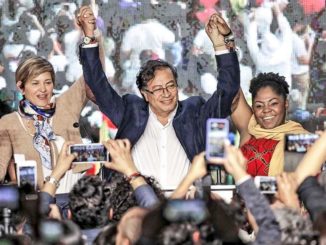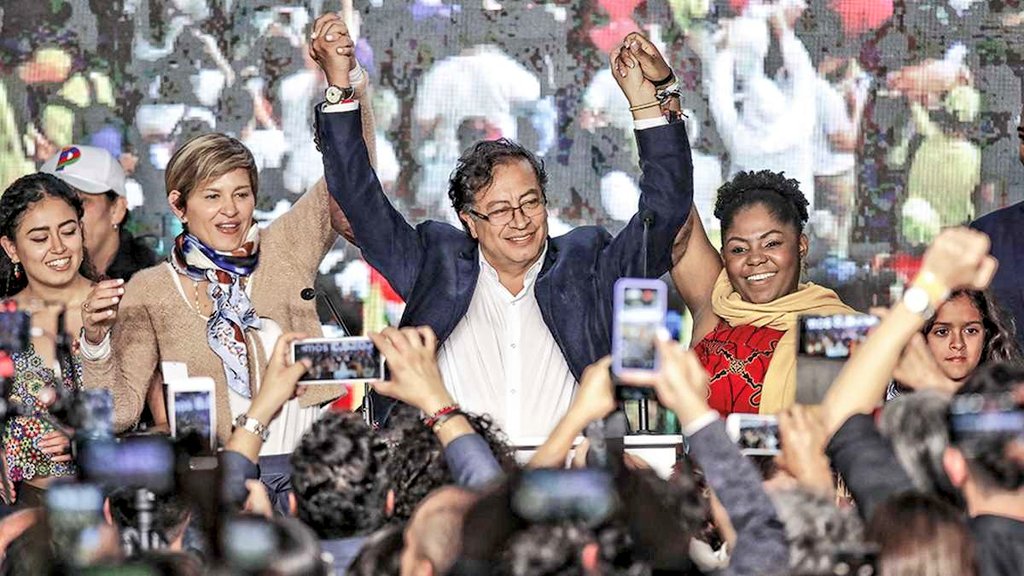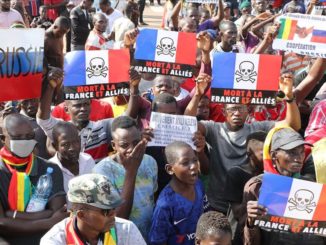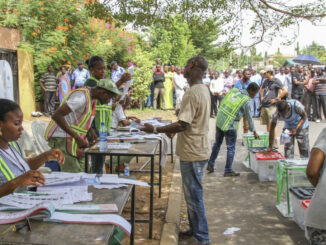Nigerian journalist Chido Onumah spoke to Peoples Dispatch about the country’s new president, Bola Tinubu. He explained the controversy in Tinubu announcing an end to fuel subsidies. Chido also explained the agenda of the new president and the political climate in the country following the controversial election.
Related Articles
Related Articles

Celebrations in Colombia’s Streets: Gustavo Petro to Be First Left-Wing President and Francia Márquez the First Afro-Descendant Woman VP

Editor’s Note: This article was updated at 7:40 a.m., June 20.
JUNE 19, 2022—Celebrations took place this evening as people took to the streets of Colombia after left-wing presidential candidate Gustavo Petro was deemed the winner of the second-round election. This victory makes his running mate, Francia Márquez, the first Afro-descendant woman who will serve as vice president once the term begins in August.
The Pacto Histórico coalition candidates won more than 50 percent of votes. Petro’s competitor, Rodolfo Hernández, conceded the election.
“I called Gustavo to congratulate him on his victory and offer him my support to fulfill the promises of change for which Colombia voted today,” Hernández tweeted. The millionaire ran on the League of Anti-Corruption Governors ticket and had been likened to a “Colombian Trump” for his brash manner. “Colombia will always count on me.”
Llamé a Gustavo para felicitarlo por el triunfo y ofrecerle mi apoyo para cumplir con las promesas de cambio por las que Colombia votó hoy. Colombia siempre va a contar conmigo.
— Ing Rodolfo Hernandez 🇨🇴! (@ingrodolfohdez) June 19, 2022
Aminta Zea, a U.S. citizen who observed the elections today, documented Colombians in the southern city of Calí embracing each other, jumping, waving flags and honking horns.
Beautiful to see Colombianos celebrating Petro’s historic win in Cali. Just see for yourself. What a huge and important shift not only for Colombia but also for Latin America and the world!! pic.twitter.com/WC7QQ1e1tp
— aminta (@amintazea) June 19, 2022
In the capital of Bogotá, the streets exploded with cheers and honks.
#ColombiaConPetro:
“¡Ganó el pueblo!”
Celebraciones en las calles de Bogotá, mientras la gente se apresura al Movistar Arena para recibir al nuevo presidente @petrogustavo. Vídeo de @MartaMartnMorn. pic.twitter.com/51ii7IQ2T2— El Ciudadano (@El_Ciudadano) June 19, 2022
Petro’s first tweet came within an hour of the announcement.
“Today is a holiday for the people. Let […] celebrate the first popular victory. May so many sufferings be cushioned in the joy that today floods the heart of the Homeland,” he tweeted. “This victory for God and for the People and their history. Today is the day of the streets and squares.”
Hoy es dia de fiesta para el pueblo. Que festeje la primera victoria popular. Que tantos sufrimientos se amortiguen en la alegria que hoy inunda el corazon de la Patria.
Esta victoria para Dios y para el Pueblo y su historia. Hoy es el dia de las calles y las plazas.
— Gustavo Petro (@petrogustavo) June 19, 2022
Márquez attracted many voters because her campaigns for both president and vice-president prioritized lifting out of poverty and oppression the country’s historically marginalized groups. She won the 2018 Goldman Environmental Prize for her activism.
Esto es por nuestras abuelas y abuelos, las mujeres, los jóvenes, las personas LGTBIQ+, los indígenas, los campesinos, los trabajadores, las víctimas, mi pueblo negro, los que resistieron y los que ya no están… Por toda Colombia. ¡Hoy empezamos a escribir una nueva historia!
— Francia Márquez Mina (@FranciaMarquezM) June 19, 2022
What’s Next for Latin America?
This victory marks a shift in the Western Hemisphere. While left-wing revolutions and candidates have over the decades swept states like Bolivia, Chile, Cuba, Honduras, Nicaragua and Venezuela, Colombia remained a militarized U.S. ally.
At least one observer had dismissed Petro’s earlier comments against the Bolivarian revolutionary process underway in Venezuela as a way to distance his popular left-wing campaign from a neighboring country many in Colombia have seen as a failure.
Congratulations came pouring through from officials and former officials in Bolivia, Mexico and other states.
Felicitamos al pueblo de Colombia, al hermano @petrogustavo, flamante presidente electo y a la hermana @FranciaMarquezM, primera vicepresidenta afrodescendiente de la historia de ese país por su indiscutible triunfo en las urnas. Es la victoria de la paz, la verdad y la dignidad. pic.twitter.com/fmC8fxvxGA
— Evo Morales Ayma (@evoespueblo) June 19, 2022
Mexico celebrating a Petro win with Colombians today! AMLO just congratulated Petro and said this is a historic victory. pic.twitter.com/ERuyUE3knB
— The Convo Couch (@theconvocouch) June 19, 2022
El triunfo de Gustavo Petro es histórico.
Los conservadores de Colombia siempre han sido tenaces y duros. El escritor José María Vargas Vila relataba que los dictadores de su país "mojaban en agua bendita su puñal antes de matar". 1/3
— Andrés Manuel (@lopezobrador_) June 19, 2022
Felicito a Gustavo Petro y a Francia Márquez, por la histórica victoria en las elecciones Presidenciales en Colombia. Se escuchó la voluntad del pueblo colombiano, que salió a defender el camino de la democracia y la Paz. Nuevos tiempos se avizoran para este hermano país. pic.twitter.com/FxodCn9Uqx
— Nicolás Maduro (@NicolasMaduro) June 19, 2022
In May, the United States invited Colombia’s defense minister to Washington to announce Colombia as a “major non-NATO ally.” The South American country’s closest access point to the Atlantic Ocean is the Caribbean Sea. The $4.5 billion in military arms and training the United States has poured into Colombia now remains a question for the incoming left-wing pair that have remarked on changing relations with the United States. Meanwhile, paramilitary violence throughout the countryside, as well as death threats to Petro and Márquez, threaten to amplify tensions in Colombia.
The Petro-Márquez Agenda
While his millionaire competitor—Hernández—claimed to be of the people, Petro said he would call a national emergency upon entering office to address hunger in Colombia. Joblessness, empty bellies and dangerous housing plague the country. The situation prompted last year’s month-long national strike.
Petro had been criticized for announcing he would end oil and gas exploration as well as phase out fossil fuels as a way to address global climate change and transform the economy. Coal and oil shipments account for almost 40 percent of the country’s exports. His announcement worried the industries.
Afro-Colombian activist and community official Victor Hugo Moreno Mina was with Márquez when armed men shot at their group during a meeting in a rural area on May 4, 2019. He said in the following exclusive interview with Toward Freedom that many areas of Colombia’s economy, as well as the societal structure, need to be transformed.
The Petro-Márquez win comes six years after peace accords were signed with the Revolutionary Armed Forces of Colombia-People’s Army (FARC-EP), which agreed to put down arms to end decades of violence. Rodrigo Londoño, a former FARC-EP commander, hailed today’s results as a victory for the peace process.
#ColombiaDecide: @TimoComunes, the former commander of the FARC-EP and a key architect of the 2016 peace accords, congratulates @petrogustavo on his victory in the presidential election and hails it as a victory for the peace process. pic.twitter.com/vL9t6TQEJ1
— Denis Rogatyuk (@DenisRogatyuk) June 19, 2022
‘Democracy Won. Black People Won.’
The second-round election was marked by reports of irregularities, as was the first round held on May 29.
Alejandra Barrios, director of Misión Observadores Electoral (MOE), an independent agency that coordinates domestic and international election observers in Colombia, reported some ballots had been marked off before voters had a chance to choose a candidate.
#19Jun #EleccionesColombia
Alejandra Barrios (@Directoramoe), directora de la MOE, presenta el segundo informe sobre las elecciones presidenciales de Colombia pic.twitter.com/3v5E5Ewljo – @VPITV— Reporte Ya (@ReporteYa) June 19, 2022
Voter intimidation and threats were cited for low turnout during the first round.
AfroResistance, an organization that supports Afro-descendant women and girls in the Americas, brought delegations into the country to observe both rounds.
“It was [a] clean and fair election in Colombia. Democracy won. Black people won,” the organization tweeted.
It was as clean and fair election in Colombia. Democracy won. Black people won. #BlackJoy #gracerootsfemenism @ggjalliance #whenblackwomenwinweallwin
— AfroResistance (@afro_resistance) June 19, 2022
Julie Varughese is editor of Toward Freedom. She has reported on Márquez’s historic candidacy, and on the 2022 Colombian elections here, here and here.

Mali Bans French NGOs, Rejecting ‘Conditional Aid’
Editor’s Note: This video report was published by African Stream.
Mali bans French-supported and -funded NGOs from operating within its borders.

Buhari Warns About Foreign Meddling As Nigeria Heads to Polls to Decide on Next President
Nigeria’s president has scolded Western diplomats for their comments about the way the February 25 presidential election is being run, warning against foreign meddling. Countries across Africa are up against Western-backed coup attempts and Western-supported disinformation campaigns. African Stream reports.
